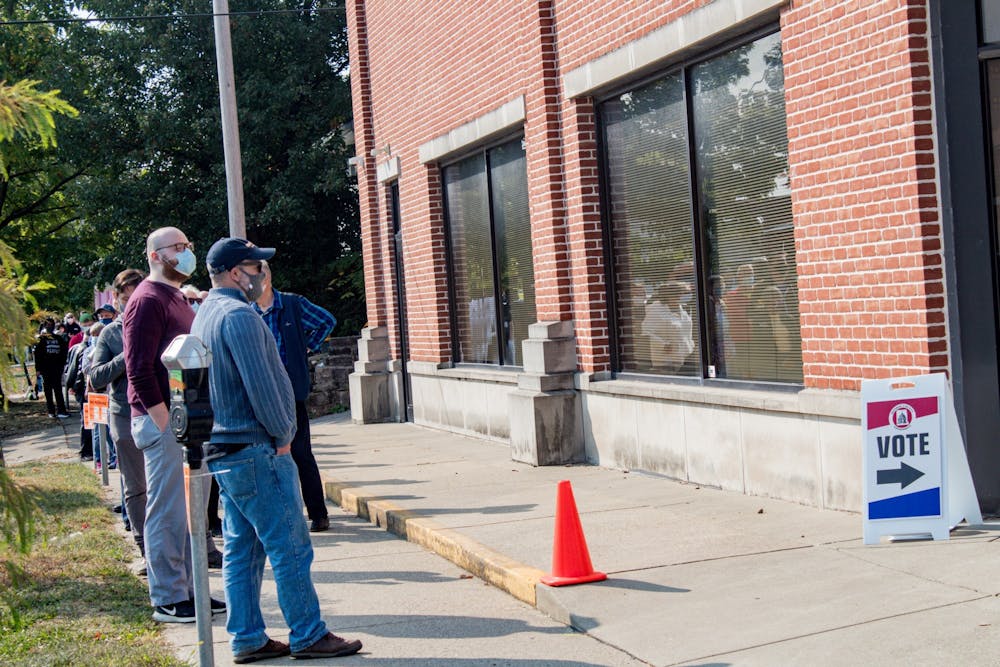Even though I go to school in Indiana, I have been and always will be a begrudgingly proud Texan.
I grew up there. My whole life is there, and I love most everything about the people, the culture and especially the food.
However, there’s one overarching and incessantly aggravating aspect of my beloved home state: the Texas legislature.
As of 2021, it remains disproportionately white, male and Republican. Of the 180 electors, 132 are men. If the legislature accurately represented the state, it would contain at least 56% more Hispanic representatives, and the number of representatives aged 20 to 34 would increase by more than 1,000%. The minimum age to serve in Texas is 21, but only four electors fall within the 20 to 34 range, according to the Texas Tribune.
Texas Gov. Greg Abbott signed into law a near ban on abortion this year. Though this legislation was written and passed by a majority of cisgendered men, it affects more than 14 million women across the state. And this imbalance persists in part because of how few voters actually show up in elections — only around 52% of eligible voters registered and turned out in Texas for the 2020 election.
If you’re an Indiana resident, you might be wondering how this applies to your life. Just because these trends are happening in my home state doesn’t mean they won’t happen — or aren’t happening — in Indiana, too. In some cases, it’s even worse.
Voting is not the end all be all — it’s the bare minimum. But we’re not doing it. Only 67% of eligible voters casted ballots in 2020, according to NPR. That left around 80 million people unaccounted for.
Texas Republican redistricting efforts resulted in districts resembling Rorschach inkblots more than representative clusters. If state Democrats in swing districts had a slim chance before, it’s now practically obliterated.
Theoretically, districts should be a cluster of a population. But unsurprisingly, in Texas, they aren’t. Texas is a huge proponent of gerrymandering, or manipulating districts of electorates to favor one party. Texas is among the 10 most gerrymandered states in the country. Because it’s one of 34 states whose legislature has primary control over district lines, electors effectively cherry-pick who votes for them in elections — not the other way around.
Republicans have an absolute chokehold on the Texas political landscape. They remain in office in part because they get to draw their own districts, making it easier to obtain. This trend continues, even though Texas consistently experiences rapid population growth and change. New neighborhoods are constantly cropping up, eagerly attracting their next congressional representative depending on community demographics, income levels and likely political affiliation.
I watched “Real Time with Bill Maher” a few weeks ago, and even though I don’t necessarily agree with everything he says, his final monologue left me shaken. For those familiar with the show, Maher referenced a “slow moving coup” that will essentially circumvent the 2024 election through political subterfuge.
Maher made three general conclusions: “Trump will run in 2024; he will get the Republican nomination; and whatever happens on election night, the next day he will announce that he won.” This announcement might precede riots similar to those on Jan. 6.
And this plan could succeed through Republican wins in the 2022 midterms, installing election officials with questionable integrity and consistent apathy from American voters.
I understand the right to vote is far more accessible to some than others. I understand the persistent inequality, particularly for people of color, as their voting prospects have been systemically restricted, criminalized and disenfranchised — and we should work toward tearing down these barriers. As we do this, we must also ensure others who have the privilege to exist without such restraints use it.
Those who live in communities with relatively easy voter access should be running to the polls, and so should young people who may not have as many economic or situational restraints. Nationally, around 65% of those aged 18 to 24 voted for Joe Biden, 11% more than any other age group, according to NBC exit polls. That means if we could increase this demographic at the polls, we could effectively change the American political landscape.
I urge anyone with the physical capability to register to vote at least 30 days before the next election and show up on election day. If we don’t, the “slow moving coup” might actually become reality.
The Texas primary election will be March 1, and the Indiana primary election will be May 3.
Natalie Gabor (she/her) is a senior studying journalism with minors in business marketing and philosophy. She hopes to one day find a career that tops her brief stint as a Vans employee.






